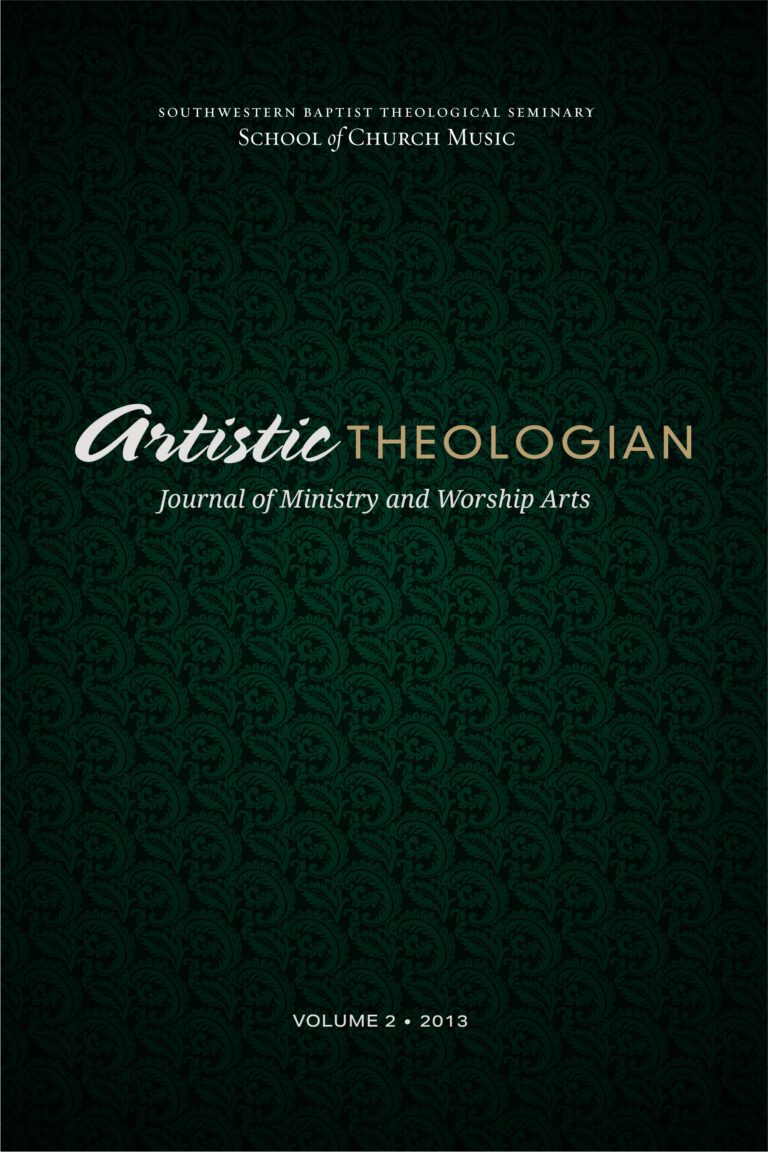
Worship Ministry: An Intersection of Ideas
Artistic Theologian
Volume 2, Summer 2013
Editor-in-Chief: John E. Simons
How Then Shall We Worship?: Biblical Principles to Guide Us Today, by R. C. Sproul. Colorado Springs, CO: David C. Cook, 2013.
Pastor, teacher, and speaker R. C. Sproul is well known in evangelical circles. Many churches have used his books for Sunday school curricula and small group discussions, such as his classic text The Holiness of God (Tyndale House Publishers, 1985). Sproul’s newest work, How Then Shall We Worship?, also deserves strong consideration for churches and lay people in their pursuit of biblical and theological studies.
The subtitle, “Biblical Principles to Guide Us Today,” captures the essence of this book. Sproul continually refers readers to Scripture throughout this work, demonstrating that he has no desire to depart from what he believes are objective principles that should guide churches and church leaders in their decision-making processes regarding worship. Furthermore, he affirms at the outset that this is a continual process of re-evaluation:
Our modern worship needs the philosophy of the second glance, an ongoing attempt to make sure that all we do in worship gatherings is to God’s glory, to His honor, and according to His will. (11)
Sproul demonstrates throughout the book his belief that only through Scripture can we determine how to properly bring glory and honor to God according to God’s will.
An important distinction to make before reading this text is to understand what Sproul means when he says “worship.” Contrary to how many Christians define worship as “music” or “singing,” Sproul is referring to the whole gathering of believers. In fact, there is very little said of music specifically. This tells the reader that the issue of worshiping in a way that is “according to His will” is much broader and more urgent to Sproul than simply deciding what kind of songs to sing. This is a “bigger picture” book that examines the root issues of Christian worship rather than addressing the symptoms. Because of this, readers looking for a list of what kind of music or style is acceptable will not find it in this book. Instead, they will follow Sproul on an examination of the “how” and the “why” of worship practices, beginning in the Old Testament and continuing through what churches should practice today.
“If God Himself were to design worship, what would it look like?” (15). Sproul points out that God did, indeed, provide very specific instructions to Moses and the Israelites how He was to be worshiped. However, the church cannot simply take what was prescribed and drop it into New Testament worship because the sacrificial system has been completely fulfilled in Christ. Even so, Sproul does suggest that the church need not eliminate the entirety of Old Testament influence and philosophy:
I am not interested in simply transferring Old Testament worship into the New Testament community, but what I am trying to find is whether there are principles we can glean from the Old Testament cultus of Israel that might have valid application in New Testament worship. (124)
Of particular interest in this examination of Old Testament principles is how the “whole person” was involved in worship; that is, all of the senses were engaged. The final few chapters of the book go into detail about how Old Testament worship was designed specifically for this purpose, and this is where the book becomes the most “practical” in application—the reader gets a sense of why God prescribed worship to be carried out in the very specific ways that the Pentateuch says He did.
A study guide appears at the end of this book, providing a good summary and outline of the material contained in each chapter. This study guide also contains the objectives of each chapter, questions for Bible study, a discussion guide, and points of application. This helps make the book a good resource for both group and private study.
How Then Shall We Worship contains strong material that deserves to be studied, reviewed, and discussed. The current “worship wars” have been destructive to churches and individuals, and texts like this can help the church take a step back and re-evaluate the “how” and the “why” of Christian worship, making sure that the church is, indeed, pursuing worship “to God’s glory, to His honor, and according to His will.”
R. Christopher Teichler
Southwestern Baptist Theological Seminary
Fort Worth, TX





